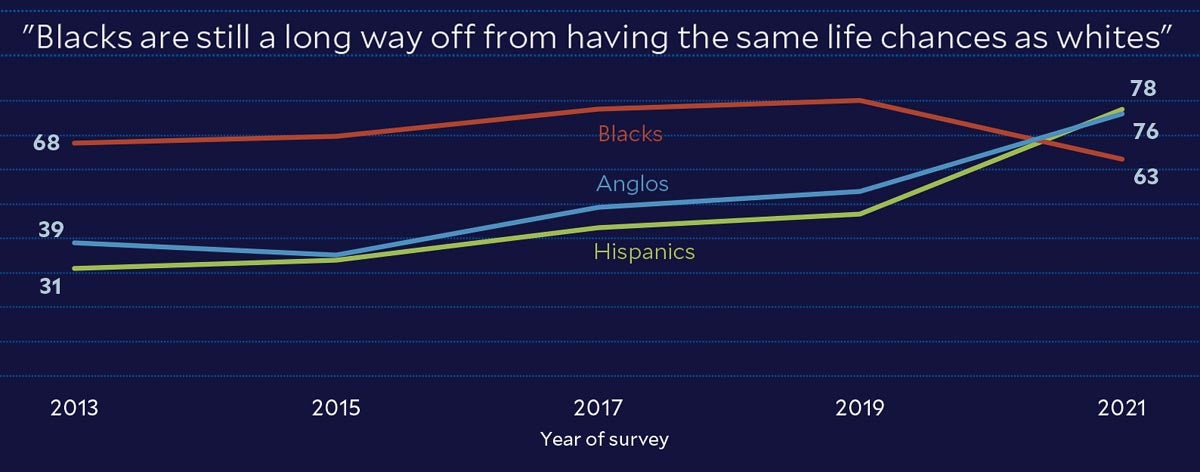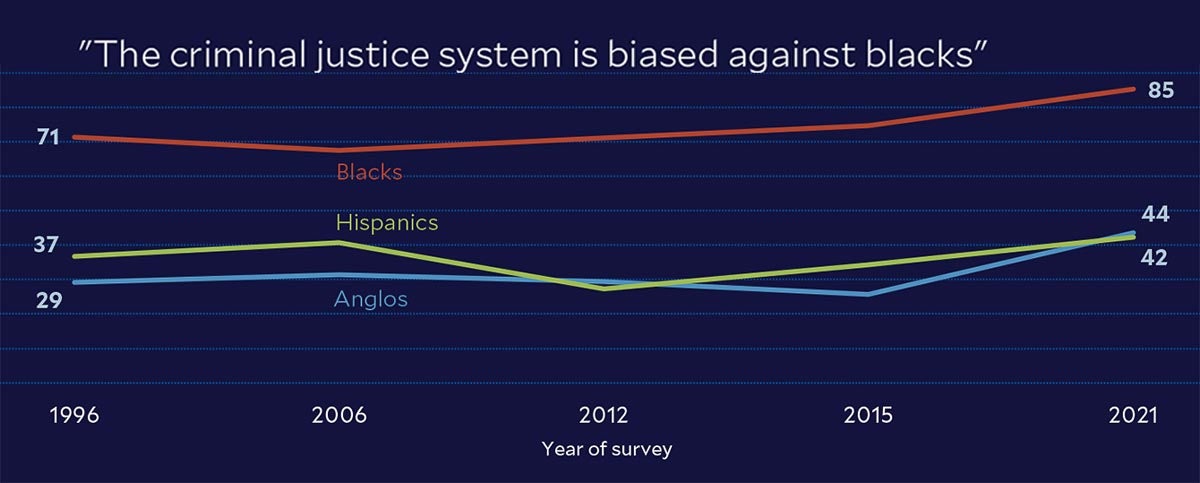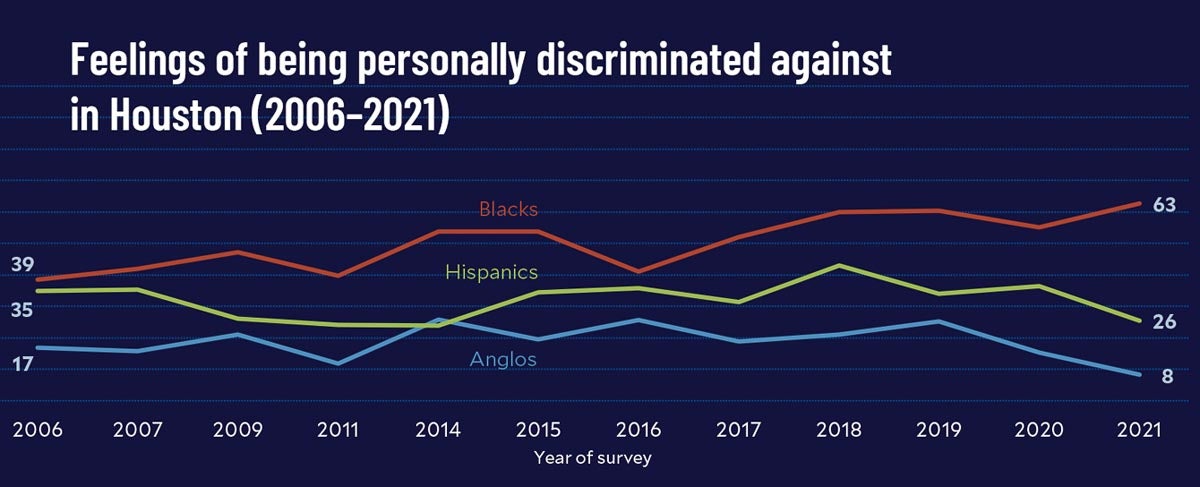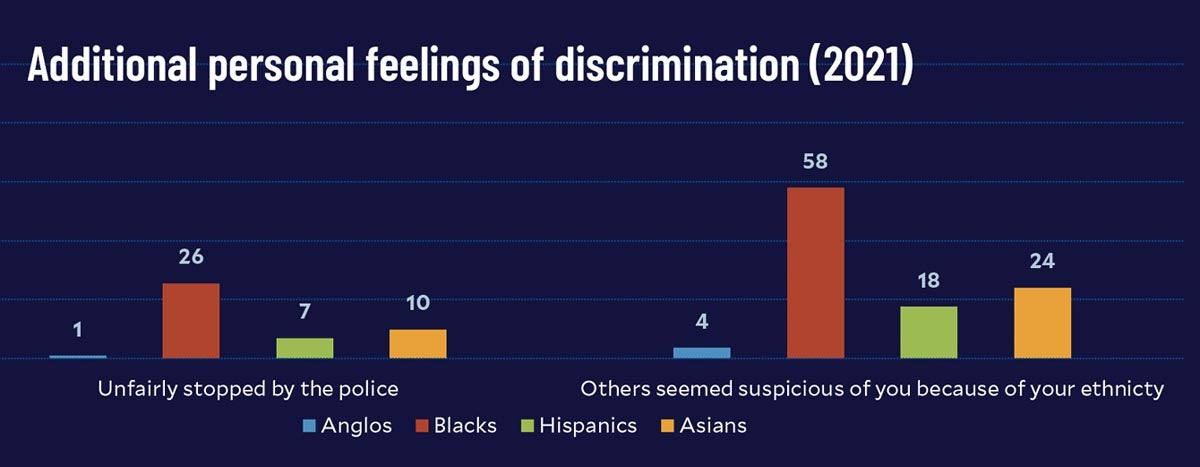Almost a year ago, on May 25, 2020, a 19-year-old clerk at a Minneapolis convenience store called police to report what he suspected was a counterfeit $20 bill used by George Floyd to pay for a pack of cigarettes. Before the day was over, Floyd would be dead after Derek Chauvin, a white police officer, knelt on the 46-year-old’s neck for more than nine minutes while Floyd lay face down and handcuffed in the street.
Following Floyd’s death, video of the arrest sparked protests against police brutality and racial injustice in more than 150 cities large and small across America, but also around the world. Demonstrators called for the end of systemic inequalities and the killing of Black men and women at the hands of police.
“The Fortieth Year of the Kinder Houston Area Survey: Into the Post-Pandemic Future”
For the past four decades, Rice University’s Kinder Houston Area Survey (KHAS) has been tracking systematically the continuities and changes in the attitudes and beliefs, opinions and experiences of Harris County residents. The results of the 2021 survey and the full report are now available.
Floyd’s murder, according to Stephen Klineberg and Robert Bozick of the Kinder Institute for Urban Research, prompted a new sensitivity to systemic racism and concerns about the deepening inequalities and racial injustice in 2020 influenced the assessment of ethnic relations across all groups.
“The Fortieth Year of the Kinder Houston Area Survey: Into the Post-Pandemic Future,” the newly released report written by Klineberg and Bozick, shows the view of ethnic group relations in the Houston area was lower this year than in the past. Overall, only 43% of respondents rated the relations among racial or ethnic groups in the Houston area as positive (“excellent” or “good”). A decline from the 55% of respondents who viewed relations as positive in 2020. Among white residents, the positive rating dropped from 70% to 54% between 2020 and 2021.
Black respondents who rated relations among ethnic groups as “excellent” or “good” declined from 30% in 2020 to just 25% in 2021 — “by far the lowest percent of positive evaluations given by any ethnic community to interethnic relations in Houston across all the years of the surveys.”

Optimism among African Americans is tied to age
The share of white residents who said they thought “Black people in the U.S. are still a long way from having the same chance in life that white people have,” increased by more than 20 percentage points between 2019 and this year — from 54% to 76%. The increase in the number of Hispanics who agreed with that statement was even greater, from less than 50% to 78% of survey participants. Across all ethnic groups, 66% agreed, up from 52% two years ago. The same question has been asked every other year since 2013, and the number of participants who agree has gone up slowly each year, but nothing close to the increase seen from 2019 to 2021.
Among all Black respondents, the percentage of those who agreed that African Americans are at a big disadvantage compared to white Americans, decreased, from 80% two years ago to 63% this year. But, Klineberg points out, a different picture emerges when Black respondents are broken out by age.
“Agreement with the assertion that African Americans are still far from having the same chance in life as white Americans was powerfully associated with age,” Klineberg and Bozick write in this year’s report. “It dropped from 72% among Blacks who were aged 60 and older to just 45% among those aged 18 to 29, the generation that came of age during Barack Obama’s eight years in office.”

Bias in the criminal justice system
In 2015, when asked if they thought Houston’s criminal justice system is biased either in favor of or against Black residents, or generally gives them fair treatment, 32% of participants responded the system is biased against that group. That was the last time the question was included in the survey until this year when 54% said the criminal justice system in Houston was biased against Black residents.
Klineberg and Bozick found that among white, Hispanic and Black residents, the share of survey participants who agreed that the criminal justice system in the city is biased against African Americans jumped significantly during the past year, “presumably a reflection of how deeply affected all Americans have been by the vivid pictures and detailed reporting of the killing of George Floyd and so many other African Americans over the past year at the hands of the police.” Among African American respondents, 85% said the justice system was biased against them — the largest share to affirm that in 40 years of the survey.
In the years between 2006 and 2021, survey participants were asked how often they felt discriminated against in Houston because of their race or ethnicity. In that time, African Americans have been far more likely than white or Hispanic respondents to say they felt discriminated against “very often” or “fairly often,” from 39% in 2006 to 63% in 2021. In contrast, the share of Hispanics responding that they’ve felt discrimination often declined from 35% in 2006 to 26% this year. Among white participants, there has been a decrease as well between those years, from 17% to 8%.
Similar differences among ethnic groups were seen in responses to being asked how often people have acted as if they were suspicious of them simply because of their race or ethnicity. Black Houston-area residents were more than two times as likely to have experienced personal feelings of discrimination such as this compared to whites, Hispanics and Asians.

2021 Kinder Houston Area Survey

Klineberg and Bozick write:
“Houston (and America) have been confronting for many years the deepening inequalities in opportunity predicated above all else on access to quality education and to jobs that can pay a living wage in this newly global, knowledge-based economy. The deep and widespread inequities have been highlighted and exacerbated by the differential vulnerabilities laid bare by the effects of the pandemic and the economic shutdown during the past year. These realities are becoming increasingly difficult to ignore.”
Will the changes in attitudes toward racial and ethnic discrimination and the growing awareness of racial injustice seen in this year’s Houston Area Survey show up in subsequent surveys?
“The beauty of this research,” Klineberg says, “is that we do the same questions every year or every other year, and you can know, ‘Is this real? Or is it Memorex? Is it really going up or is it just a part of the normal fluctuation?’ But it does look as if there’s a pattern of Anglos and Hispanics who are less likely to see their groups as discriminated against and more likely to see Blacks as discriminated against. Whether that continues is one of the interesting reasons to keep doing these surveys.”

